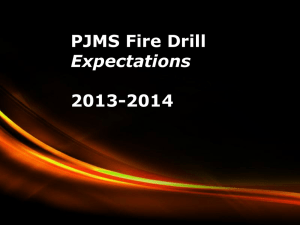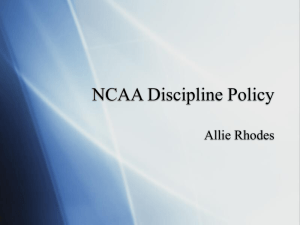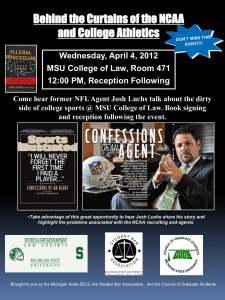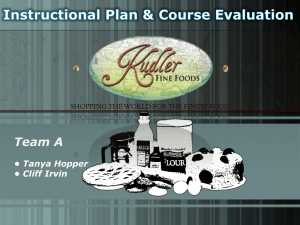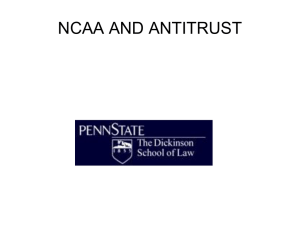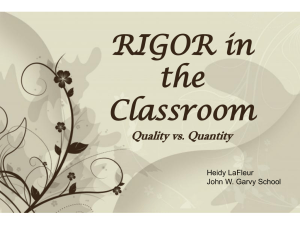Investigative
advertisement
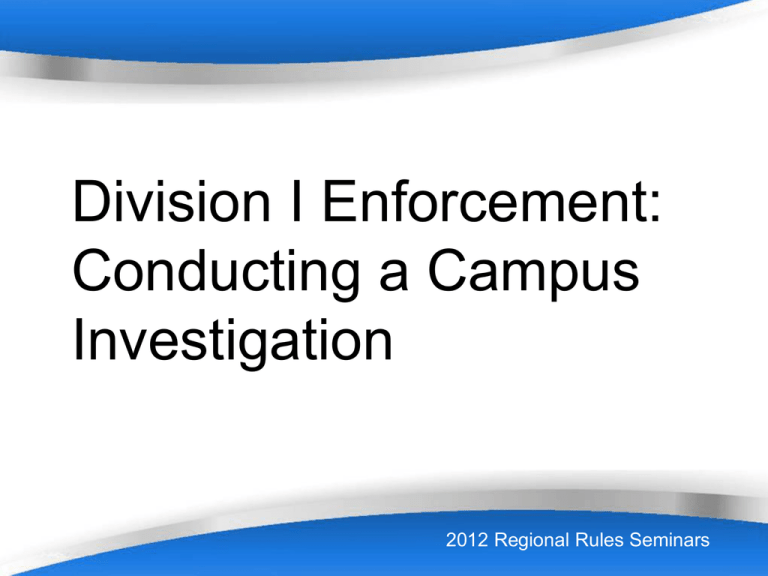
Division I Enforcement: Conducting a Campus Investigation Powerpoint Templates 2012 Regional Rules Seminars NCAA Enforcement Page 1 Session Overview Purpose: Discuss methods and strategies for investigating NCAA rules violations on campus, including suggestions for gathering documents, conducting interviews and working with the enforcement staff. Outline: I. Introduction A. Major versus Secondary B. Cooperative Principle II. Methods III. Strategies IV. Conclusion Powerpoint Templates NCAA Enforcement Page 2 Defining a Secondary Violation Secondary (NCAA Bylaw 19.02.2.1) – Isolated or inadvertent in nature, – Provides or is intended to provide only a minimal recruiting, competitive or other advantage, and – Does not include any significant recruiting inducement or extra benefit. Powerpoint Templates NCAA Enforcement Page 3 Defining Major Violations Major (Bylaw 19.02.2.2) All violations, other than secondary violations, specifically those that provide an extensive recruiting or competitive advantage. Powerpoint Templates NCAA Enforcement Page 4 Cooperative Principle (Bylaw 32.1.4) • Imposes an affirmative obligation to assist enforcement staff in developing full information to determine whether violation(s) occurred. • Requires all individuals to protect the integrity of an investigation and failure to do so may be a violation of the principles of ethical conduct. • In some instances, to protect the integrity of an investigation, the enforcement staff may not be able to share information with the institution. Powerpoint Templates NCAA Enforcement Page 5 Cooperative Principle Other Pertinent Principles and Bylaws: Responsibility for control [2.1.1 and 2.1.2] Principle of rules compliance [2.8.1] General obligation of membership [3.2.4.1] Refusal to furnish information [10.1-(a)] Responsibility to cooperate [19.01.3] Responsibility to cooperate [32.3.7.2] Powerpoint Templates NCAA Enforcement Page 6 A Further Look at Cooperation • Institutions are obligated to cooperate. The NCAA Committee on Infractions (COI) will consider the degree of the institution's cooperation. • Parties are not to disseminate information among themselves that might impede development. • Failure to cooperate could result in an allegation of a violation of the principles of ethical conduct and/or the cooperative principle. • The COI considers whether an institution's inquiry was complete and thorough. Powerpoint Templates NCAA Enforcement Page 7 Methods Powerpoint Templates NCAA Enforcement Page 8 Rationale for Establishing a Written Investigative Policy • Promotes uniformity/ transparency. • Provides for a timely and organized response to potential violations. • Lack of policy may lead to questions of institutional control. • COI may review institutional policy and protocol. Powerpoint Templates NCAA Enforcement Page 9 Content of Investigative Policies • Guidelines setting forth circumstances in which an inquiry is conducted. • Roles/responsibilities of administrators. • Statement of confidentiality. • Consequences for failing to report violations. • Procedures for addressing, correcting and preventing violations. • Procedures for reporting violations, investigations and sanctions. Powerpoint Templates NCAA Enforcement Page 10 Gathering Information: Interviews Recommendations for the Institutional Investigator: • Identify individuals to be interviewed. • Determine who should be present for each interview. • Find a location for interviews that is comfortable, disturbance free and has low visibility. • Explain the purpose of the interview - determine knowledge of or involvement in violations. Do not specify the substance of the interview. Powerpoint Templates NCAA Enforcement Page 11 Gathering Information: Interviews Recommendations for the institutional investigator: • Record each interview. • State on the record, the name of the person interviewed, date, time, location and individuals present. • Review the obligation to tell the truth and be forthcoming [Bylaws 10.01 & 10.1] and ramifications for not being truthful [Bylaws 10.4]. • Opportunity for legal counsel. Powerpoint Templates NCAA Enforcement Page 12 Gathering Information: Documents • Use of releases. • Possible documents/information to be reviewed: Financial Records: Bank Statements Credit/Debit Cards Western Union Transfers Travel Records: Air Travel Hotel/Lodging Phone Records: Cell Text Powerpoint Templates NCAA Enforcement Page 13 Gathering Information: Documents • Possible documents/information to be reviewed: Vehicle Information Computer Records: Email Hard drives Social Media: Twitter/Facebook Academic Documents: Transcripts SAT/ACT information Powerpoint Templates NCAA Enforcement Page 14 Evaluating Information • The administrator responsible for evaluating information should be set forth in the institutional policy. • Identify eligibility issues. If any exist, contact Student-Athlete Reinstatement. Institutional Responsibility [Bylaw 14.01.1]. Powerpoint Templates NCAA Enforcement Page 15 Notifying Enforcement • Contact enforcement staff when guidance is needed. • Staff may join the investigation or allow the institution to continue inquiry on its own. • Early contact may avoid duplicative efforts. • Staff may have additional information regarding potential violations. Powerpoint Templates NCAA Enforcement Page 16 Content of the Investigative Report • Purpose • Case chronology • General overview of findings • Overview of the institutions investigation • Specific findings • Other possible violations • Corrective actions • Conclusions • Appendix Powerpoint Templates NCAA Enforcement Page 17 Strategies Powerpoint Templates NCAA Enforcement Page 18 Determining Who to Interview • Sources outside the institution. Boosters Business People Parents Prospects High School Coaches Former Student-Athletes • Who can be trusted? • Corroborating sources. Powerpoint Templates NCAA Enforcement Page 19 Determining Who to Interview Institutional Staff Members • Who is an institutional staff member? Coaches Administrators Academic Counselors Tutors Secretaries/Support Staff Another Student-Athlete Professors • Be thorough (this can be difficult with campus personnel). Powerpoint Templates NCAA Enforcement Page 20 Determining Who to Interview Institutional Staff Members • Identify who is potentially "at risk" for involvement in the violations. • Strategy discussions should not include potentially "at risk" individuals. Powerpoint Templates NCAA Enforcement Page 21 Order of Interviews • Interview outside sources first. • Conduct interviews in a timely fashion. • Consider the sequence of interviews. • Instruct individuals to not discuss information. • Anticipate interviews will take longer than expected. Powerpoint Templates NCAA Enforcement Page 22 Conducting the Interviews • Prior to interview, collect supporting documents. • Conduct the tough interview. • Discuss previous collection of significant information and the importance of being truthful. Powerpoint Templates NCAA Enforcement Page 23 Interviewing Details • Telephone or in-person? At risk individuals: interview in-person. If information is significant: interview in-person. • Cold call or prearranged? Suspect non-cooperation: cold call. To avoid talking with other witnesses: cold call. • Where to conduct interviews? Controlled and private setting. Accommodating off-campus individuals. Powerpoint Templates NCAA Enforcement Page 24 Interview Techniques Questioning and listening techniques. Purpose of the interview is to gather information. • Two types of information: Investigative: Who, what, where, why, when, how and who can corroborate. Behavioral: Emotions, attitudes and non-verbal responses. Powerpoint Templates NCAA Enforcement Page 25 Effective Interviewing • Ask open-ended questions. The best information is a narrative response. Interviewee should do the majority of the talking. Begin questions with a verb or command word. • Pause to elicit more information. Avoid interruptions. - Increases opportunity for obtaining more information. - Silence is okay. • Ask specific questions. • Paraphrase responses to determine accuracy of the information. Powerpoint Templates NCAA Enforcement Page 26 Suggestions for Interviewers • Refrain from interruptions. • Visual aids can be useful. • Avoid offering advice, being judgmental or filling in gaps. • Good listeners are good interviewers. • Calendars may prove to be useful to pinpoint timeframes. Powerpoint Templates NCAA Enforcement Page 27 Compliance Systems • Make honest, candid assessments. • Identify potential breakdowns. • Determine the scope of violations. • Implement meaningful corrective actions. • Will help avoid future violations of the same kind, promote earlier detection and avoid potential failure to monitor and/or lack of institutional control charges. Powerpoint Templates NCAA Enforcement Page 28 Conclusion • Suggestions should help member institutions in handling the "nuts and bolts" of conducting effective investigations of potential major NCAA rules violations on campuses. • If a hearing before the COI is required, the committee will take into consideration the thoroughness of the institution's internal investigation. • Don't take a chance by leaving investigation methods and strategies (or lack of) open to criticism. Powerpoint Templates NCAA Enforcement Page 29 Conclusion • If you need help or advice: Contact the enforcement staff. Contact the conference office. Website (www.ncaa.org) - links to enforcement information and databases. • Questions? Powerpoint Templates NCAA Enforcement Page 30
